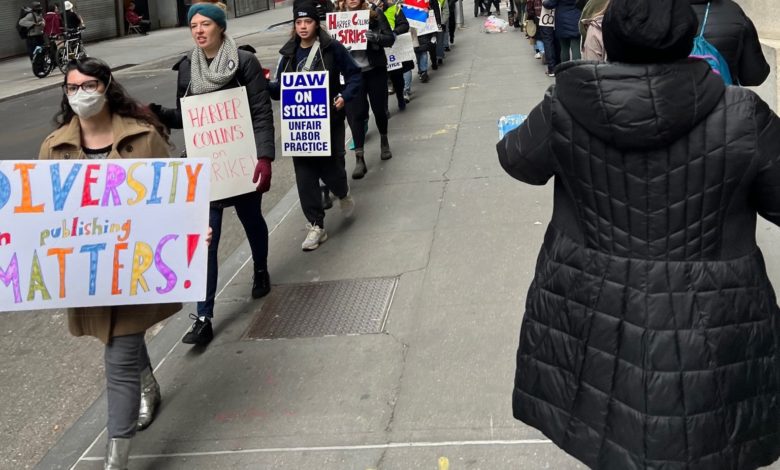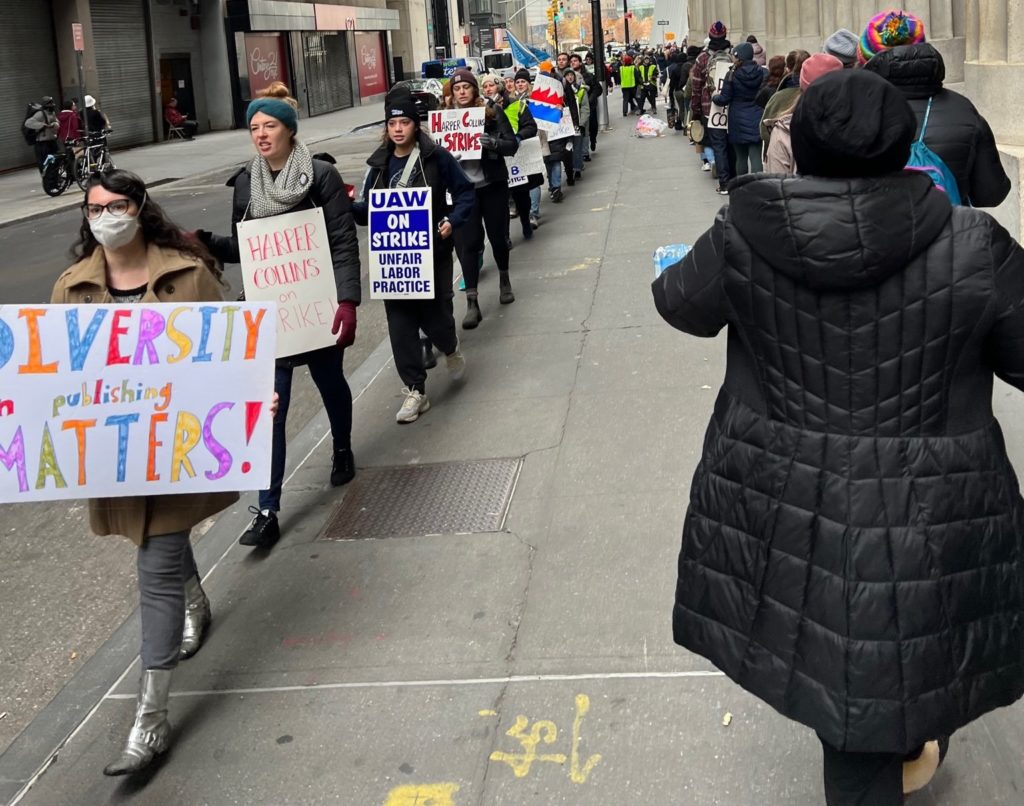
Over 200 workers at HarperCollins Publishers have been on strike since Nov. 10 to demand a fair contract after 11 months of bargaining.
As Liberation News reported during the union’s one-day strike last July, the workers’ demands include fair wages, more diversity in hiring, family leave benefits, union security and better accountability for the company. Out of 204 ballots cast in the strike authorization vote, 95.1% voted in favor of the strike, despite the company announcing layoffs and hiring freezes just beforehand.
‘Clearly they miss our labor, they need us back’
Liberation News spoke with several workers outside the company’s office in Lower Manhattan on the first day of the strike. They all expressed faith in their struggle, despite strikebreaking efforts by management.
“We understand that there’s been a lot of scrambling going on inside this week about getting work done,” said Laura Harshberger, a senior production editor in Children’s Books and union chairperson. “Today, we know that the President of [HarperCollins Children’s Books], Suzanne Murphy, sent out a memo to managers that ‘we have a budget for temps, you can hire a temp if you need one, we’re going to try to expedite the process.’ We’ve been laughing about it all afternoon, since clearly they miss our labor, they need us back, and yet their strategy is to stopgap replace us rather than [respond to] the very simple, reasonable asks we have on the table.”
Harshberger also indicated that the company’s tactics in the strike’s first week were less than conciliatory: “Management seems to be choosing every day to take an antagonistic stance against us, and their only plan seems to be antagonizing, bullying and waiting to see if this will blow over, rather than working on negotiating with us. It’s day 6 and they haven’t scheduled a bargaining session yet.”
Workers expressed hope that their actions could impact the publishing industry at large, which is known as a competitive industry to break into. Despite record profits last year, full-time salaries at HarperCollins start at $45,000 or less. Poor wages are standard across the industry, as the “Big Five” publishers — HarperCollins, Penguin Random House, Hachette Livre, Simon & Schuster, and Macmillan — can easily collude to keep wages low.
“What we’re asking for here is to establish a completely reasonable floor of a living wage in New York City to get it up to $50,000. If we were able to do that, you would think there’d be a degree of competition and it would perhaps improve wages across the entire industry,” explained Harshberger. “We feel a lot of support from other workers in the industry. We know that there’s a lot of eyes on us. We feel a responsibility to fight as hard as we can for this, in the hope that we could make a change that could have a ripple effect through the entire industry.”
Stephanie Guerdan, an associate editor in Children’s Books, joined many on the picket line in expressing love for their work, but dissatisfaction with the company’s union-busting tactics.
“We have been bending over backwards to give them terms they could easily agree to, to settle, and they keep rejecting them out of hand,” Guerdan said. “This [strike] is in many ways a last resort kind of thing. We really want to get back to work, we just can’t keep doing it under the conditions we were doing it before.”

Authors in solidarity
Authors have acted in solidarity with strikers throughout the week by releasing public statements of support, sending meals to the picket line, and wearing pro-union pins to the National Book Awards. Writer Franny Choi even used her previously scheduled “takeover” of the HarperCollins Instagram to interview a union leader about the struggle.
Guerdan explained that authors are negatively impacted by editors’ poor working conditions as well. High employee turnover at publishing houses creates “orphaned authors,” which refers to contracted writers whose editors have left the company. Editors at major publishers coordinate all aspects vital to a book’s success, such as production, distribution and marketing. Thus, books by orphaned authors can expect to be neglected outright by a publishing house or reassigned to an overworked editor unable to give the book the attention it needs to succeed.
The workers have compiled a list of ways to act in solidarity with them, such as donating to their strike fund and emailing the HR department. They are not asking for a boycott of HarperCollins books, to prevent negatively impacting authors whom they recognize as fellow workers.
A renewed phase of struggle
Organizers at HarperCollins worked tirelessly to revitalize union membership in preparation for this contract renewal. Only a few workers were union members when they began to negotiate their last contract at the end of 2017. As an open shop, all HarperCollins workers receive union benefits whether or not they are dues-paying union members.
“Once we signed that last contract in 2018, we immediately went into an organizing campaign as if we were organizing a brand new union,” said Guerdan. “Reaching out to every single person, having an organizing conversation, finding out what people’s priorities were … really trying to build a union that was both transparent and accessible, and open to the workers while having the power to fight.”
Only 36 workers ratified the last contract in 2018, eight of whom had signed union cards that day in order to vote on the contract. Today over 80% of members have signed union cards. “We’re out here because we love what we do,” said Guerdan.
HarperCollins workers join tens of thousands of union siblings in striking this month, including 48,000 University of California workers, over 1,300 part-time faculty at the New School and workers at over 100 Starbucks stores.
Workers first unionized independently at Harper & Brothers in 1942, before its merger with publisher Collins in 1990. The union is now affiliated with UAW Local 2110, which represents more than 3,000 workers at workplaces such as Columbia University, the Museum of Modern Art and the American Civil Liberties Union.
From 1942 to 2022, the workers’ struggle for dignity and power lives on, and the HarperCollins workers clearly draw inspiration from labor movement history. When asked the goals of the strike in simple terms, Guerdan alludes to the famous demand of the 1912 Lawrence textile workers’ strike: “Bread and roses. We are entitled to be both comfortable and fed, but also have time for leisure and the beautiful things in life.”




